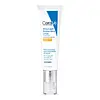What's inside
What's inside
 Key Ingredients
Key Ingredients

 Benefits
Benefits

 Concerns
Concerns

 Ingredients Side-by-side
Ingredients Side-by-side

Butyl Methoxydibenzoylmethane
UV AbsorberEthylhexyl Methoxycinnamate
UV AbsorberWater
Skin ConditioningCyclopentasiloxane
EmollientOctyldodecyl Neopentanoate
EmollientPhenethyl Benzoate
EmollientDimethicone
EmollientGlycereth-26
HumectantHydroxyethyl Acrylate/Sodium Acryloyldimethyl Taurate Copolymer
Emulsion StabilisingPhenoxyethanol
PreservativeHydroxypropyl Starch Phosphate
Cetearyl Glucoside
EmulsifyingCarbomer
Emulsion StabilisingPyrus Malus Fruit Extract
Skin ConditioningButylene Glycol
HumectantSodium Hydroxide
BufferingDisodium EDTA
Sodium Hyaluronate
HumectantLavandula Angustifolia Oil
MaskingIodopropynyl Butylcarbamate
PreservativePelargonium Graveolens Flower Oil
MaskingRosmarinus Officinalis Leaf Oil
MaskingLecithin
EmollientMelilotus Officinalis Extract
AstringentHaslea Ostrearia Extract
Skin ConditioningPalmaria Palmata Extract
Skin ProtectingCalendula Officinalis Flower Extract
MaskingGlycerin
HumectantLeontopodium Alpinum Extract
Skin ConditioningRetinyl Palmitate
Skin ConditioningTocopheryl Acetate
AntioxidantAnthemis Nobilis Flower Oil
MaskingPeucedanum Ostruthium Leaf Extract
Skin ConditioningBuddleja Davidii Leaf Extract
Skin ConditioningArtemisia Umbelliformis Extract
Skin ConditioningButyl Methoxydibenzoylmethane, Ethylhexyl Methoxycinnamate, Water, Cyclopentasiloxane, Octyldodecyl Neopentanoate, Phenethyl Benzoate, Dimethicone, Glycereth-26, Hydroxyethyl Acrylate/Sodium Acryloyldimethyl Taurate Copolymer, Phenoxyethanol, Hydroxypropyl Starch Phosphate, Cetearyl Glucoside, Carbomer, Pyrus Malus Fruit Extract, Butylene Glycol, Sodium Hydroxide, Disodium EDTA, Sodium Hyaluronate, Lavandula Angustifolia Oil, Iodopropynyl Butylcarbamate, Pelargonium Graveolens Flower Oil, Rosmarinus Officinalis Leaf Oil, Lecithin, Melilotus Officinalis Extract, Haslea Ostrearia Extract, Palmaria Palmata Extract, Calendula Officinalis Flower Extract, Glycerin, Leontopodium Alpinum Extract, Retinyl Palmitate, Tocopheryl Acetate, Anthemis Nobilis Flower Oil, Peucedanum Ostruthium Leaf Extract, Buddleja Davidii Leaf Extract, Artemisia Umbelliformis Extract
Butyl Methoxydibenzoylmethane 3%
UV AbsorberHomosalate 10%
Skin ConditioningEthylhexyl Salicylate 5%
UV AbsorberOctocrylene 2.7%
UV AbsorberWater
Skin ConditioningC12-15 Alkyl Benzoate
AntimicrobialGlyceryl Stearate Se
EmulsifyingMethyl Methacrylate Crosspolymer
Glycerin
HumectantPentylene Glycol
Skin ConditioningCeramide NP
Skin ConditioningCeramide AP
Skin ConditioningCeramide EOP
Skin ConditioningCarbomer
Emulsion StabilisingSodium Acryloyldimethyltaurate/Vp Crosspolymer
Emulsion StabilisingSodium Lauroyl Lactylate
EmulsifyingSodium Hyaluronate
HumectantCholesterol
EmollientPhenoxyethanol
PreservativeDisodium EDTA
Hydroxyacetophenone
AntioxidantCitric Acid
BufferingPhytosphingosine
Skin ConditioningXanthan Gum
EmulsifyingT-Butyl Alcohol
PerfumingEthylhexylglycerin
Skin ConditioningButyl Methoxydibenzoylmethane 3%, Homosalate 10%, Ethylhexyl Salicylate 5%, Octocrylene 2.7%, Water, C12-15 Alkyl Benzoate, Glyceryl Stearate Se, Methyl Methacrylate Crosspolymer, Glycerin, Pentylene Glycol, Ceramide NP, Ceramide AP, Ceramide EOP, Carbomer, Sodium Acryloyldimethyltaurate/Vp Crosspolymer, Sodium Lauroyl Lactylate, Sodium Hyaluronate, Cholesterol, Phenoxyethanol, Disodium EDTA, Hydroxyacetophenone, Citric Acid, Phytosphingosine, Xanthan Gum, T-Butyl Alcohol, Ethylhexylglycerin
 Reviews
Reviews

Ingredients Explained
These ingredients are found in both products.
Ingredients higher up in an ingredient list are typically present in a larger amount.
Also known as Avobenzone, this ingredient is a chemical sunscreen filter that provides protection in the UV-A range.
Avobenzone is globally approved and is the most commonly used UV-A filter in the world.
Studies have found that avobenzone becomes ineffective when exposed to UV light (it is not photostable; meaning that it breaks down in sunlight). Because of this, formulations that include avobenzone will usually contain stabilizers such as octocrylene.
However, some modern formulations (looking at you, EU!) are able to stabilize avobenzone by coating the molecules.
Avobenzone does not protect against the UV-B range, so it's important to check that the sunscreen you're using contains other UV filters that do!
The highest concentration of avobenzone permitted is 3% in the US, and 5% in the EU.
Learn more about Butyl MethoxydibenzoylmethaneCarbomer is a polymer of acrylic acid. Its main role is to create a gel consistency.
A high amount of carbomer can cause pilling or balling up of products. Don't worry, most products contain 1% or less of carbomer.
Disodium EDTA plays a role in making products more stable by aiding other preservatives.
It is a chelating agent, meaning it neutralizes metal ions that may be found in a product.
Disodium EDTA is a salt of edetic acid and is found to be safe in cosmetic ingredients.
Learn more about Disodium EDTAGlycerin is already naturally found in your skin. It helps moisturize and protect your skin.
A study from 2016 found glycerin to be more effective as a humectant than AHAs and hyaluronic acid.
As a humectant, it helps the skin stay hydrated by pulling moisture to your skin. The low molecular weight of glycerin allows it to pull moisture into the deeper layers of your skin.
Hydrated skin improves your skin barrier; Your skin barrier helps protect against irritants and bacteria.
Glycerin has also been found to have antimicrobial and antiviral properties. Due to these properties, glycerin is often used in wound and burn treatments.
In cosmetics, glycerin is usually derived from plants such as soybean or palm. However, it can also be sourced from animals, such as tallow or animal fat.
This ingredient is organic, colorless, odorless, and non-toxic.
Glycerin is the name for this ingredient in American English. British English uses Glycerol/Glycerine.
Learn more about GlycerinPhenoxyethanol is a preservative that has germicide, antimicrobial, and aromatic properties. Studies show that phenoxyethanol can prevent microbial growth. By itself, it has a scent that is similar to that of a rose.
It's often used in formulations along with Caprylyl Glycol to preserve the shelf life of products.
Sodium Hyaluronate is hyaluronic acid's salt form. It is commonly derived from the sodium salt of hyaluronic acid.
Like hyaluronic acid, it is great at holding water and acts as a humectant. This makes it a great skin hydrating ingredient.
Sodium Hyaluronate is naturally occurring in our bodies and is mostly found in eye fluid and joints.
These are some other common types of Hyaluronic Acid:
Learn more about Sodium HyaluronateWater. It's the most common cosmetic ingredient of all. You'll usually see it at the top of ingredient lists, meaning that it makes up the largest part of the product.
So why is it so popular? Water most often acts as a solvent - this means that it helps dissolve other ingredients into the formulation.
You'll also recognize water as that liquid we all need to stay alive. If you see this, drink a glass of water. Stay hydrated!
Learn more about Water